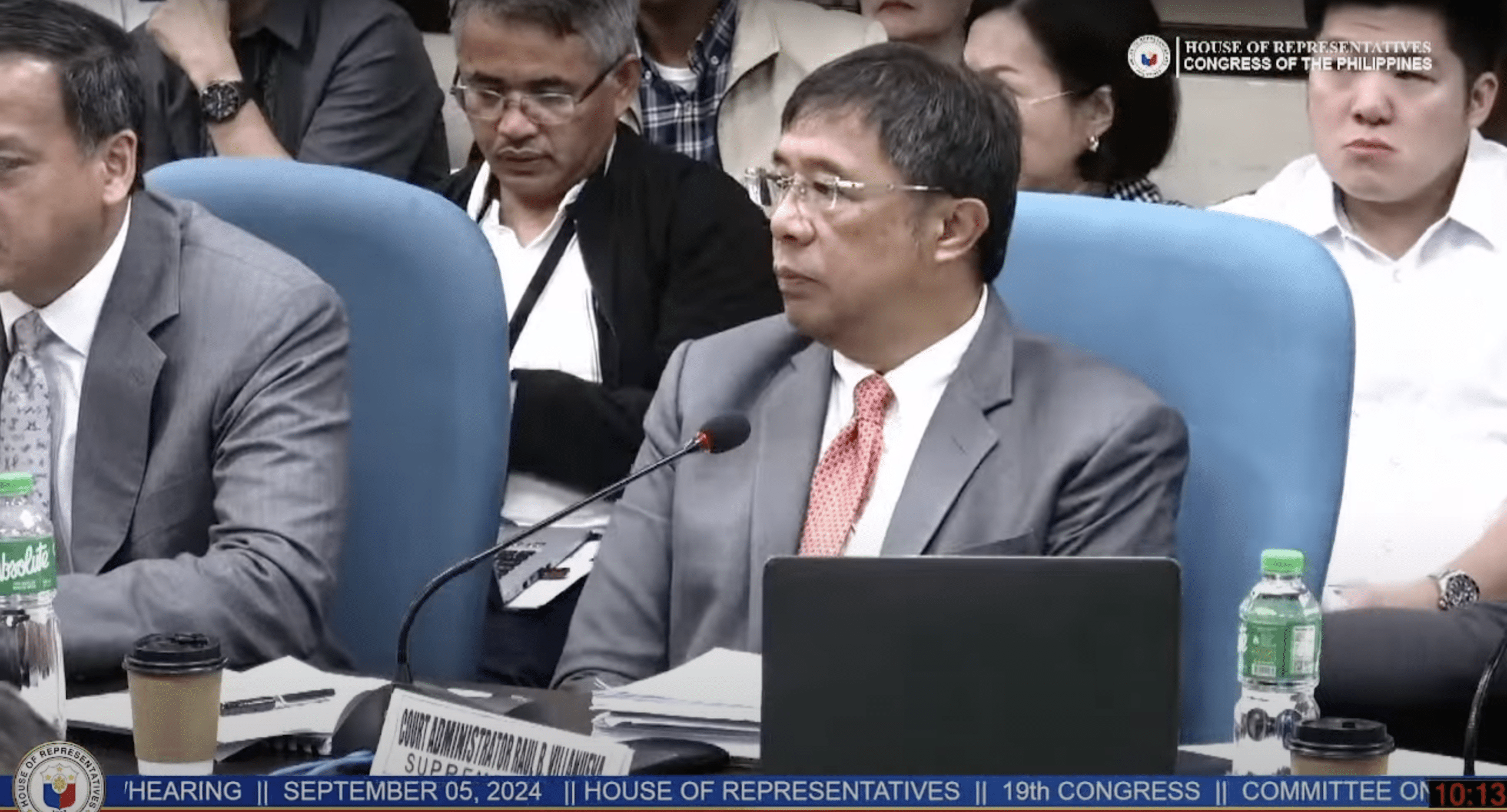SC seeks PPP inclusion in 2025 budget to fast-track infra, ICT projects

Court Administrator Raul Villanueva speaks before the House panel on appropriations’ hearing for the 2025 proposed budget of the Judiciary on Thursday, September 5, 2024. (Screenshot from the House of Representatives/Youtube)
MANILA, Philippines — The Supreme Court on Thursday asked for the inclusion of public-private partnerships (PPPs) in the 2025 General Appropriation Bill for the Supreme Court’s major infrastructure projects, citing its importance in “fast-tracking” implementation of projects.
In a House panel on appropriations hearing for the 2025 proposed budget of the Judiciary, Court Administrator Raul Villanueva presented the P84.39 billion proposed budget, which includes their appeal to include PPPs in the budget bill.
“We’re asking for the inclusion because it is not included in the NEP (National Expenditure Program) Special provisions, the provision on public-private partnership for major infrastructure projects and/or procurements.
“This provision is actually a strategy for the Judiciary to address its current limitations and future challenges with respect to the procurement of ICT (information and communications technology) equipment and the construction of courthouses nationwide,” said Villanueva in his presentation.
According to the PPP Center, PPP is a “contractual agreement” between the government and the public sector to finance, design, implement, and operate infrastructure projects traditionally done by the public sector. This partnership also offers monetary and non-monetary aid to the public firm.
Article continues after this advertisementREAD: SC goes digital: E-filing a must in civil cases starting Sept. 1
Article continues after this advertisementThe 2024 General Appropriations Act included Special Provision No. 10 on PPPs for major infrastructure projects and/or procurement.
“The provision also enhances capability of the Supreme Court to implement major infrastructure projects and procurements to attain the objectives of the strategic plan for the Judicial innovations,” Villanueva added.
Projects under PPP
When asked about the projects the Court would implement under the partnership, Villanueva shared that they are planning to implement ICT projects and construct courthouses across the country.
“Ang iniisip po namin ‘yong sa mga ICT kasi (What we’re thinking is ICT because) we’re into automation, and the backbone of our SPJI (Strategic Plan for Judicial Innovations) is the ICT facilities that we need, and the structures. So that’s one. Basically, something that we’re looking at,” he noted.
The Supreme Court launched the SPJI 2022-2027 in October 2022 “to address institutional challenges using four guiding principles: the Judiciary’s delivery of justice will be (1) timely and fair, (2) transparent and accountable, (3) equal and inclusive, and (4) technology adaptive.”
Villanueva also clarified that under this provision, they would not venture into commercial operations.
“We’re looking at the possibility to fast-track this because there is that provision about PPP. We’re not into commercial operations; we would just like to fast-track and expedite the implementations of projects,” he said.
READ: SC gets healthcare plan for judiciary employees
The court official also explained how the partnership could streamline the process of building courthouses.
“Others would be the construction of halls of justice through PPP because we do not have designs for big halls of justice. We have to pass through getting first a consultant for the design, and after, the completion of the Detailed Architectural and Engineering Design. After getting that, which actually takes six months to one year to complete, the bidding and deliverables, then the construction starts,” he enumerated.
“So it takes a while. We think that PPP will cut short this process because we can already consider unsolicited offers for example for purposes of construction requirements that we have,” he added.
Safeguards to avoid ‘conflict of interest’
Gabriela Partylist Rep. Arlene Brosas raised the possibility of having a conflict of interest in entering into this partnership and asked about the safeguards the Court would take to avoid it.
According to Villanueva, they are engaging in consultations with the PPP Center. “We are aware of that possibility, but we look at the PPP as something that will enable us to fast-track the implementation of projects,” he said.
Villanueva also noted they will coordinate with the National Economic and Development Authority (Neda) in proceeding with the partnership without going through the full procurement process, as long as they meet certain requirements.
“The usual PPP is that there is really a partnership, but there’s also a version of that PPP wherein there is a budget already. At least we can proceed without having to go through actual procurement procedures, only with respect that have to be complied with and some coordination with Neda on the matter,” he emphasized.
“But mostly because our projects do not exceed P15 billion, that’s why many of our projects can be considered on that line. That’s why we’re pushing for that so we can have the flexibility,” he added.
READ: Big boost to PPP program